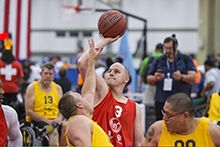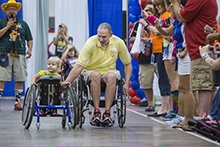Shaun Castle opens up about his injury, being a professional and collegiate athlete and how being a member of PVA saved his life.
By Courtney Verrill
U.S. Army veteran and professional athlete Shaun Castle was just hours away from death when a miracle happened. Castle recovered and over the years has worked hard to make dreams he thought he’d never live to see come true. His recovery has been tough, but Paralyzed Veterans of America (PVA) has helped him with his recovery and has given him countless opportunities in the adaptive sports world.
“I’ve been an athlete my entire life,” says Castle. “I had no idea [about adaptive sports], but when I found out that there was wheelchair basketball, a sport that I played very well at a very high level my entire life, it was just immediately like ‘wow, I can be a basketball player again.’”

His injury
Castle joined the U.S. Army in October 2000 and served as a military police officer. In 2004, Castle was injured during a training accident. The injury left him with two cracked vertebrae and three herniated discs, which led to needing prosthetic discs in his spinal cord. Immediately after his surgery, he started doing rehab and was originally able to walk. Castle was fully mobile for about a year after he came home, but his mobility reached an end. He ended up having to use a wheelchair. Years later he had a deathly allergic reaction to his pain medications and his life was close to ending.
“When I got to the hospital I didn’t realize quite how far gone I was and was actually pretty close to passing away,” he says.
Fortunately, Castle recovered. Not long after his recovery, he found the Lakeshore Foundation in Birmingham, Ala., where he did his rehabilitation.
PVA’s role in his recovery
“It’s been like I have a guardian angel that I carry with me that anytime anything happens, I can turn to them and go what do I do, how do it do it and they say, ‘Don’t worry we are taking care of this for you’, and they have,” Castle says about PVA.
Castle thanks PVA for his success and the opportunities that have come his way.
“I get to play basketball as collegiate athlete and a professional athlete, I’m in a commercial, I was in a movie, I’ve been all over different magazines, I’m traveling the world, I’m on the radio, I’m meeting these amazing people and I’m opening up doors to be able to help other veterans,” Castle says. “It is an unbelievable blessing that I have been able to be a part of PVA.”
From near death to top athlete
After his recovery, Castle got heavily involved in adaptive sports. He was determined to recover quickly and would spend six days of the week in the gym at the Lakeshore foundation.
“I would spend four to five hours a day in the gym playing wheelchair basketball, doing cardio, weights, swimming, I did all of it” says Castle. “I was literally there six days a week and the only reason I wasn’t there seven days was because they were closed on Sundays.”

Castle’s determination paid off and he became a top athlete to watch for, playing wheelchair basketball all over the country. He played at the National Veterans Wheelchair Games (NVWG) two years in a row and landed a spot on a professional team in Lyon, France.
“In Europe, adaptive athletics is so far beyond what it is here in terms of recognition and following that happens in Europe,” says Castle. “The first game I played in France was in an arena that held 3,000 people and it was packed. They were loud and passionate. It was an unbelievable experience for somebody who was used to only playing in front of family and friends.”
When he returned from Europe, he wanted to go to college and continue playing basketball. Going to college had always been a dream of Castle’s, and adaptive sports helped make his dream become a reality. Luckily for Castle, even though he played professionally, he was still able to join the team at his college. He is currently a senior at the University of Alabama in Tuscaloosa, Ala., where he plays a big role as an athlete for the wheelchair basketball team. The Modern Media and American Law major will be graduating this August after only three years at the university. Over the course of three years, Castle has maintained a 4.0 grade point average (GPA) while being a top athlete, traveling, having a social life and spending time with his wife, Stephanie.
After he graduates he will be returning to France to play another season of professional wheelchair basketball.
Being a student before an athlete
Castle believes that academics should always come before athletics, and he proves that with his 4.0 GPA.
“I’m 35 years old and the one thing I’ve learned more than anything in this world is that father time comes for us all, and I don’t mean when we pass away, I mean eventually we’re going to have to stop being athletes,” says Castle. “We can stay active but high level athletics is eventually going to come to an end and it is your mind that is going to be able to change things in this world.”
Castle has had many accomplishments during his time at the university, but his biggest accomplishment is his 4.0 GPA.
Goals for the future
Castle’s hard work and determination has taken him far, but he wants to go even farther. He is currently working towards making it to Tokyo in 2020 for the Paralympics. He was invited to a USA developmental camp in July of 2016 and impressed all the right people. Although Tokyo is his highest goal, he will not be disappointed if he doesn’t make it.
“It is the ultimate goal to wear the stars and stripes and to represent my country outside of the [military] uniform, with team USA across my chest,” says Castle. “There’s nothing more in this world that I want and it is what has driven me since day one, but if I don’t get there, honestly, my life won’t be destroyed because it’s the journey to get there that matters. I’ve accomplished more than I have ever dreamed of. The journey has been unbelievable and I wouldn’t be disappointed [if I didn’t make it].”
Castle is going to keep working towards that goal. In the meantime, he is hoping to represent his country at the Invictus Games in Toronto this September.
Advice for people wanting to play adaptive sports
“If you’re injured or disabled or whatever the case may be and thinking about wanting to try adaptive athletics, do it!” says Castle. “Get in that chair, get on that field, get in the pool, do exactly what you want to do. Adaptive athletics gave me a reason to get up and pursue, so if someone is thinking ‘I don’t know what to do with my life,’ I don’t care what their age is, get out there. Try it. Get around these people. It’s infectious. You will love it. I don’t care if you get in your chair for the first time and think ‘gosh I am terrible,’ because guess what, we all were. The first time I got in the chair, I wasn’t very good, but I worked hard and I got around other people who just were driven to be great. And even if that’s not your goal, if your goal is to just try it, get out there. Do it! You never know where it could lead.”